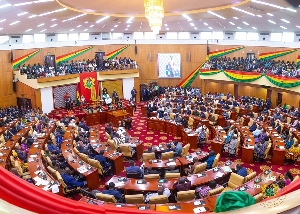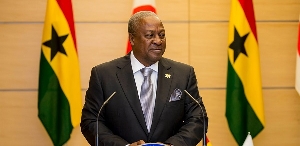


Mercy360 Blog of Tuesday, 10 December 2024
Source: Mercy Mensah
Ghanaian stated in street interviews: Reasons Behind the New Patriotic Party's (NPP) Defeat in the 2024 Ghanaian General Election.

The New Patriotic Party's (NPP) historic defeat in the 2024 general elections was a culmination of several factors. At the forefront of these factors was poor leadership, which was characterized by a lack of effective communication.
The party's leadership displayed a clear disregard for grassroots sentiment and participatory communication. This top-down approach to decision-making created internal rifts that eventually spilled into the general elections. The party's inability to engage with its base and address their concerns led to a sense of disconnection and disillusionment.
Another critical factor that contributed to the NPP's defeat was their policy missteps. The implementation of the E-Levy, for instance, was widely unpopular and compounded the economic burden on citizens. The government's arrogant posture and refusal to listen to public sentiment only exacerbated the situation.
The NPP's failure to address the economic hardship experienced by Ghanaians was also a significant contributor to their defeat. High inflation, rising cost of living, and reduced purchasing power had become a norm under the NPP's leadership. The party's inability to acknowledge the suffering of ordinary people and their refusal to review harmful policies created a toxic relationship between the government and the governed.
The crisis within the NPP, marked by acts of impunity and internal power struggles, also played a significant role in their defeat. The party's inability to manage its internal conflicts and present a united front to the electorate ultimately led to their downfall.
The NPP's leadership was also criticized for its lack of empathy and failure to engage with key stakeholders. The party's refusal to listen to the concerns of ordinary Ghanaians and its failure to address the economic hardship they faced created a sense of disillusionment and disconnection.
Furthermore, the NPP's failure to deliver on its campaign promises also contributed to its defeat. The party's inability to provide jobs, improve the economy, and address the needs of ordinary Ghanaians created a sense of disappointment and disillusionment among the electorate.
The NPP's historic defeat serves as a lesson to political parties and leaders. It highlights the importance of effective communication, participatory governance, and empathy in leadership. It also underscores the need for leaders to listen to the concerns of ordinary people and to address the economic hardship they face.
In conclusion, the NPP's historic defeat was a culmination of several factors, including poor leadership, policy missteps, internal conflicts, and a failure to deliver on campaign promises. The party's inability to engage with its base, address the economic hardship faced by ordinary Ghanaians, and provide effective leadership ultimately led to its downfall.


















